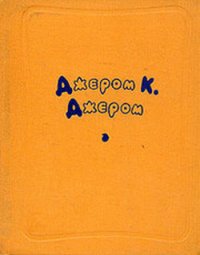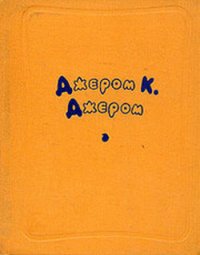My First Book - Jerome Jerome Klapka (читать книги онлайн полностью без регистрации .TXT) 📗

In the correspondence column of the Halfpenny Welcome Guest, which is among my buried treasures, there is an 'answer' instead of the poem which I had fondly hoped to see inserted in its glorious pages. And this is the answer: 'G. R. S.—Your poem is not quite up to our standard, but it gives decided promise of better things. We should advise you to persevere.'
I am quoting from memory, for after turning that box upside down, I can't lay my hand on this particular Welcome Guest, though I know that it is there. I don't know who the editor was who gave me that kindly pat on the head, but whoever he was he earned my undying gratitude. At the time I felt I should have liked him better had he printed my poem. I was no more fortunate with my prose than I was with my poetry. I began to tell stories at a very early age, but it was not until after I had succeeded in getting a poem printed among the 'Answers to Correspondents' that I took seriously to prose with a view of publication. I was encouraged to try my hand at writing stories by the remembrance of the success which had attended my efforts at romantic narrative when I was a school-boy.
There were eight other boys in the dormitory I slept in at Hanwell (the College, not the Asylum), and they used to make me tell them stories every night until they fell asleep, and woe betide me if I cut my narrative short while one of them remained awake. I wasn't much of a boy with a bolster or a boot, but they were all champions, and many a time when I had married the hero and heroine and wound up my story did I have to start a fresh complication in a hurry to save myself from chastisement. I remember on one occasion, when I was dreadfully sleepy, and I had got into a fearful fog as to who committed the murder, I made a wild plunge at a ghost to get me out of the difficulty, and the whole dormitory rose to a boy and set about me with bolsters in their indignation at such a lame and impotent conclusion.
Night after night did those maddening words, 'Tell us a story,' salute my ears as I laid my weary little head upon the pillow, and I had to tell one or run the gauntlet of eight bolsters and sixteen slippers, to say nothing of the biggest boy of all, who kept a reserve pair of boots hidden away under his bed for purposes not altogether unconnected with midnight excursions to a neighbouring orchard.

It was the remembrance of my early story-telling days that prompted me, when poetry seemed a drug in the market, to try my hand at what is now, I believe, called 'The Complete Novelette.'
I set myself seriously to work, laid in a large stock of apples and jumbles, and spent several consecutive afternoons in completing a story which I called 'A Pleasant Evening.' After I had written it I copied it out in my best hand, and then, with fear and trembling, I sent it to the Family Herald.
I sent it to the Family Herald because I had heard a lady who visited at our house say that she knew a lady who knew a lady who had sent a story to the Family Herald, never having written anything before in her life, and the story had been accepted, and the writer had received five pounds for it by return of post.

I didn't receive anything by return of post, but in about a fortnight my manuscript came back to me. Nothing daunted, I carefully cut off the corner on which 'Declined with thanks' had been written, and I sent the story to Chamber's Journal. Here it met with a similar fate, but I fancy it took a little longer to come back, and it bore signs of wear and tear. I knew, or I had read, that it was not wise to let your manuscript have the appearance of being rejected, so I spent several unpleasant evenings in writing 'A Pleasant Evening' out again, and I sent it to All the Year Round.
It came back! This time I didn't take the trouble to open it I knew it directly I saw it, and as it reached me so I flung it in my desk and bit my lips, and made up my mind that after all it was better to be accepted as a poet in the 'Answers to Correspondents' column of the Halfpenny Journal than to be rejected as a story-writer by the editors of higher-priced periodicals.

But though I played with poetry again, I didn't even succeed in getting into the 'Answers to Correspondents.' My vaulting ambition o'erleaped its selle, and I sent my verses to journals which didn't 'correspond.' In those days I kept a little book, in which I entered all the manuscripts I sent to editors, and from it now I copy the following instructive record. R stands for 'Returned':—
| Once a Week | 'The Minstrel's Curse' | R. |
| Belgravia | 'After the Battle' | R. |
| Broadway | 'After the Battle' | R. |
| Fun | 'Nearer and Dearer' | R. |
| Fun | 'An Unfortunate Attachment' | R. |
| Fun | 'A Song of May' | R. |
| Banter | 'Nearer and Dearer' | R. |
| Judy | 'An Unfortunate Attachment' | R. |
| London Society | 'The Minstrel's Curse' | R. |
| Owl | 'Nearer and Dearer' | R. |
Returned! Returned! Returned! All I got for my pains was the chance of making a joke in my diary on my birthday. In those days of my wild struggles with Fate I find written against the 2nd of September, 'Many unhappy Returns.'
I believe that I should have flung up authorship in despair, and never have had a first book, but for the chance remark of the dear old doctor who looked after my health in the days when I hadn't to pay my own doctor's bills.

He was talking about me one day in my father's private office, and I happened to be passing, and I heard him say, 'He's a nice lad—what a pity he scribbles!' Scribbles! the word burnt itself into my brain, it seared my heart, it brought the hot blood to my cheeks, and the indignant tears to my eyes. Was I not ready to write an acrostic at a moment's notice on the name of the sweetheart of any fellow who asked me to do it? Had I not written a poem on the fall of Napoleon, which my eldest sister had read aloud to her schoolfellows, and made them all mad with jealousy to think there wasn't a brother among the lot of them who could even rhyme decently? Had I not had stories rejected by the Family Herald, All the Year Round, and Chambers's Journal, and a letter on the subject of the crossing opposite St. Mark's Church, Hamilton Terrace, printed in the Marylebone Mercury? And was I to be dubbed a scribbler, and pitied for my weakness? It is nearly twenty years since those words were uttered, and my dear old doctor rests beyond the reach of all human ills, but I can hear them now. They have never ceased to ring in my ears as they rang that day.




